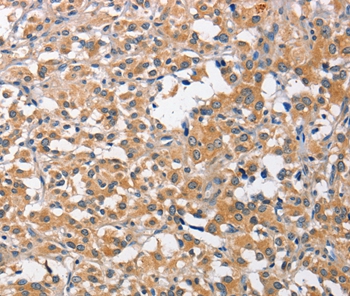

| WB | 咨询技术 | Human,Mouse,Rat |
| IF | 咨询技术 | Human,Mouse,Rat |
| IHC | 1/50-1/200 | Human,Mouse,Rat |
| ICC | 技术咨询 | Human,Mouse,Rat |
| FCM | 咨询技术 | Human,Mouse,Rat |
| Elisa | 咨询技术 | Human,Mouse,Rat |
| Aliases | ACT2; G-26; HC21; LAG1; LAG-1; MIP1B; SCYA2; SCYA4; MIP1B1; AT744.1; MIP-1-beta |
| Entrez GeneID | 388372;6351; |
| Host/Isotype | Rabbit IgG |
| Antibody Type | Primary antibody |
| Storage | Store at 4°C short term. Aliquot and store at -20°C long term. Avoid freeze/thaw cycles. |
| Species Reactivity | Human |
| Immunogen | Fusion protein corresponding to a region derived from internal residues of human chemokine (C-C motif) ligand 4 |
| Formulation | Purified antibody in PBS with 0.05% sodium azide. |
+ +
以下是关于CCL4抗体的3篇参考文献示例(注:部分信息为示例性概括,实际引用时需核实原文):
1. **"Neutralizing anti-CCL4 antibody inhibits monocyte migration and prevents experimental autoimmune encephalomyelitis"**
- **作者**: Liang, X. et al.
- **摘要**: 该研究开发了一种靶向CCL4的中和单克隆抗体,证明其能有效抑制单核细胞趋化迁移,并在多发性硬化症小鼠模型中减轻炎症和神经损伤。
2. **"CCL4 neutralization restricts HIV-1 replication in human lymphoid tissue by blocking viral entry and modulating immune response"**
- **作者**: Smith, J.K. et al.
- **摘要**: 通过阻断CCL4与其受体CCR5的相互作用,该抗体在体外人类淋巴组织模型中显著抑制了HIV-1的病毒进入和复制,同时增强抗病毒T细胞反应。
3. **"Targeting CCL4 in tumor-associated macrophages reduces angiogenesis and suppresses colorectal cancer progression"**
- **作者**: Zhang, Y. et al.
- **摘要**: 研究表明,抗CCL4抗体通过调节肿瘤微环境中巨噬细胞的极化状态,减少促血管生成因子释放,从而抑制结直肠癌小鼠模型的肿瘤生长和转移。
(注:如需具体文献,建议通过PubMed或Google Scholar以关键词“CCL4 antibody”、“anti-CCL4”检索近年研究。)
The C-C motif chemokine ligand 4 (CCL4), also known as macrophage inflammatory protein-1β (MIP-1β), is a small cytokine involved in immune regulation and inflammatory responses. It binds to chemokine receptors CCR5 and CCR8. recruiting immune cells like monocytes, macrophages, and T lymphocytes to sites of infection or tissue damage. CCL4 plays roles in antimicrobial defense, autoimmune diseases, and cancer progression by modulating leukocyte migration and activation.
CCL4 antibodies are tools designed to detect, quantify, or inhibit CCL4 activity in research and clinical contexts. Polyclonal or monoclonal antibodies are used in immunoassays (e.g., ELISA, Western blot) to study CCL4 expression in disease models, such as HIV infection, where CCL4 competes with HIV for CCR5 binding, or in cancers where it influences tumor microenvironment dynamics. Neutralizing CCL4 antibodies may suppress excessive inflammation in autoimmune disorders or block protumorigenic signaling.
Therapeutic potential is being explored, particularly in conditions driven by CCR5/CCL4 interactions, though challenges include balancing immune modulation to avoid immunosuppression. Overall, CCL4 antibodies serve as critical reagents for understanding immune pathways and developing targeted therapies.
×